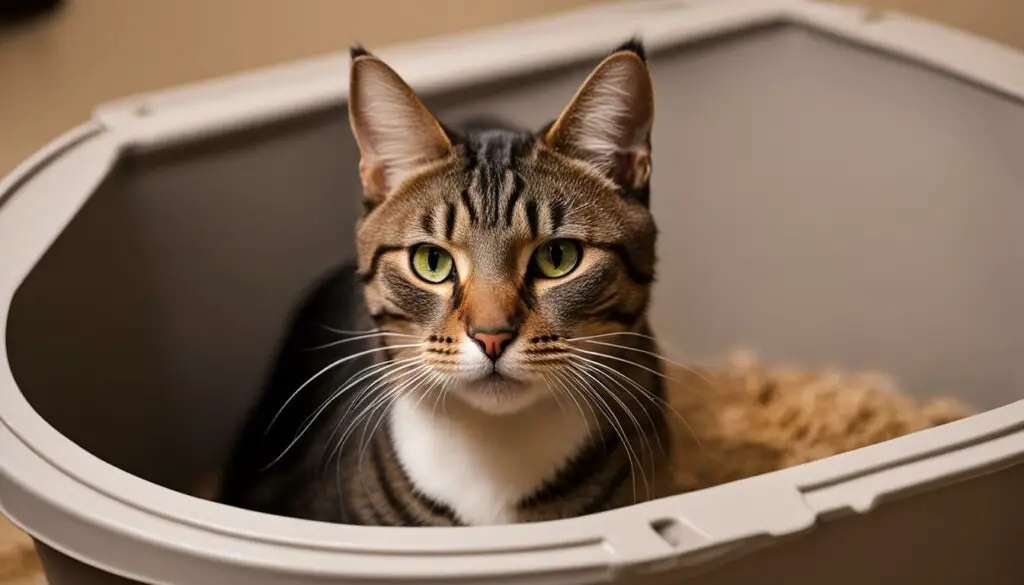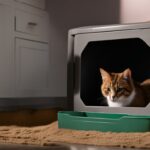Greetings, cat owners! Today, I want to talk about a common behavior exhibited by our feline friends – meowing in the litter box. As responsible pet parents, it’s crucial to understand why our male cats engage in this behavior and how we can address their needs. So, let’s dive in and explore the fascinating world of cat behavior and litter box training!
Key Takeaways:
- Male cats may meow in the litter box for various reasons, including medical issues and behavioral problems.
- Understanding the specific cause behind your cat’s meowing can help ensure their well-being.
- Litter box training and addressing any underlying health or behavioral issues are essential in maintaining a healthy and happy cat.
- Creating a calm and secure environment for your cat can help alleviate stress-related meowing in the litter box.
- Regular veterinary check-ups and open communication with your vet are important in managing your cat’s litter box behavior.
Interpreting The Litter Box Lingo
When your cat meows in the litter box, it’s important to understand the meaning behind their vocalization. Cats use various meows to communicate their needs and feelings. This behavior can be influenced by pain, stress, or simply habit. By deciphering the messages behind their meows, you can better understand your feline friend’s needs and address any underlying issues that may arise.
To interpret your cat’s meows in the litter box, it’s essential to pay attention to their body language and overall behavior. Cats may meow softly or loudly, have a consistent meow pattern, or exhibit distress during elimination. These cues can provide valuable insights into the meaning of their vocalization.
A useful way to identify the meaning behind your cat’s meow is by observing their overall health and the presence of any discomfort or pain. If your cat exhibits signs of pain, such as frequent meowing accompanied by straining or restlessness in the litter box, it could indicate a medical issue. On the other hand, if your cat appears relaxed and shows no signs of physical distress, their meowing may be more related to communication or habit.
| Meow Type | Possible Meaning |
|---|---|
| Prolonged, low-pitched meow | Pain or discomfort |
| Short, rapid meow | Request for attention or assistance |
| Repetitive meowing | Desire for cleaning or a change in the litter box |
| Meow followed by scratching the litter | Expression of territorial behavior |
Understanding your cat’s vocalizations in the litter box can strengthen your bond and ensure their well-being. If you notice any changes in their meowing behavior or have concerns about their health, it’s always best to consult with a veterinarian to address any potential issues.
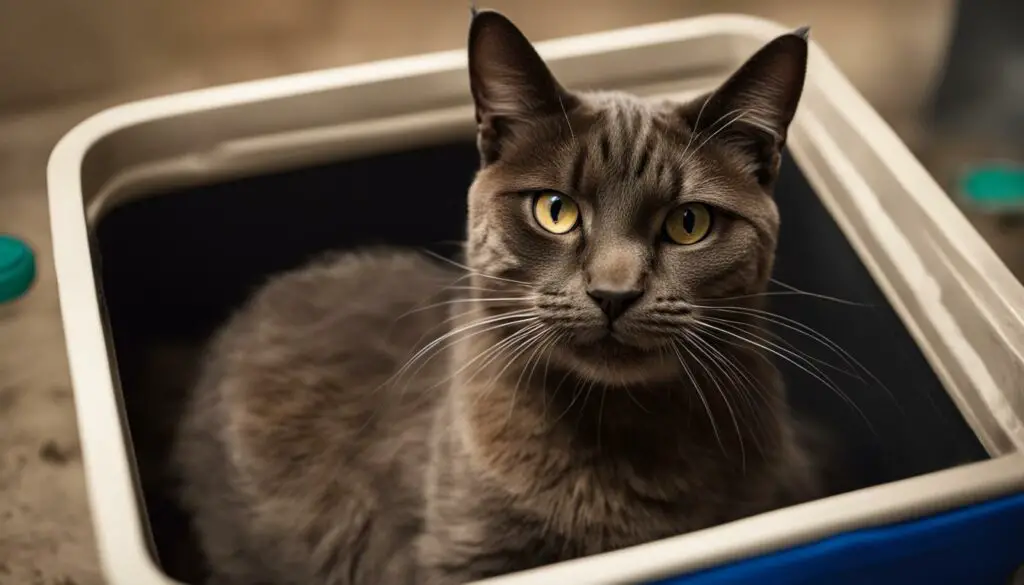
Key Takeaways:
- Cats meow in the litter box to communicate their needs, express discomfort, or seek attention.
- Observing your cat’s body language and behavior can help you interpret the meaning behind their meows.
- Recognizing signs of potential pain or distress is crucial and warrants a visit to the veterinarian.
- Understanding your cat’s meows can strengthen your bond and promote their overall well-being.
Medical Reasons for a Cat’s Vocalization
When a male cat meows in the litter box, it could be a sign of underlying medical issues. Cats are known to vocalize when they are in pain or discomfort, and the litter box is no exception. It’s important to be aware of these potential medical causes to ensure the well-being of your furry friend.
Urinary Tract Issues
One common medical reason for a male cat’s vocalization in the litter box is urinary tract issues. Conditions such as urinary tract infections, bladder inflammation, or the presence of crystals in the urine can cause discomfort and pain during elimination. Cats may meow to express their discomfort and seek attention or relief.
To address urinary tract issues, it is crucial to consult with a veterinarian. They can perform diagnostic tests to determine the underlying cause and provide appropriate treatment, which may include medication, dietary changes, or other interventions to promote urinary tract health.
Preventing urinary tract issues in male cats is also important. Ensure your cat stays hydrated by providing fresh water and consider feeding them a balanced diet that promotes urinary health. Regular vet check-ups can help identify and address any potential issues early on.
| Common Medical Reasons for a Male Cat’s Vocalization in the Litter Box | Symptoms | Treatment |
|---|---|---|
| Urinary Tract Issues | Vocalization during elimination, frequent urination, blood in urine | Consult a veterinarian for diagnosis and treatment. Treatment may include medications, dietary changes, or other interventions. |
It’s important to note that vocalization in the litter box can also be caused by other medical conditions, such as constipation, anal sac problems, or inflammatory bowel disease. If your male cat continues to vocalize in the litter box or exhibits any other unusual behavior, it is best to seek veterinary advice to ensure proper diagnosis and treatment.
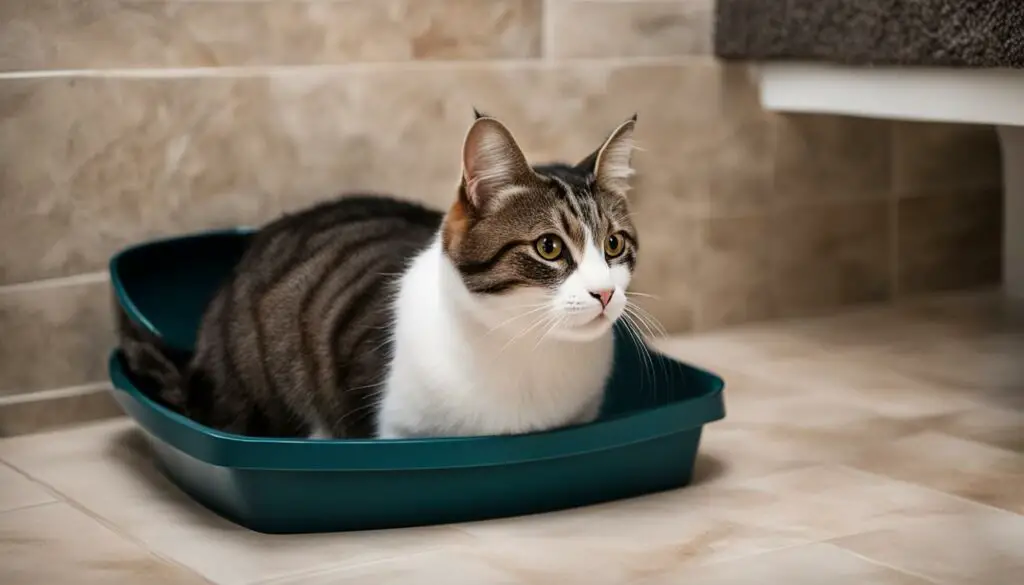
Obstruction Of The Urethra
If your male cat is meowing in the litter box, it is essential to consider the possibility of a blocked urethra. A full obstruction of the urethra can be a life-threatening emergency and requires immediate veterinary care. This condition, also known as urinary blockage, can cause severe pain and prevent your cat from urinating.
Blocked urethra is more common in male cats due to their narrower urethral opening. The obstruction can occur as a result of urinary stones, mucus plugs, or other materials blocking the passage of urine. The buildup of urine in the bladder can lead to the accumulation of toxins in the body, causing a range of symptoms, including meowing in the litter box.
If you suspect your cat may have a blocked urethra, it is crucial to seek veterinary assistance right away. Your vet will perform a thorough examination and may need to use a catheter to relieve the obstruction and allow urine to flow freely. In severe cases, hospitalization and further treatment may be necessary to stabilize your cat’s condition.
| Symptoms of Urinary Blockage in Male Cats: |
|---|
| 1. Frequent trips to the litter box without urinating |
| 2. Straining or difficulty urinating |
| 3. Crying or meowing in the litter box |
| 4. Licking the genital area excessively |
| 5. Blood in the urine |
Preventing urinary blockage in male cats involves maintaining good urinary tract health. Ensure your cat has access to fresh water at all times to promote hydration. Feeding a balanced diet that supports urinary health can also be beneficial. Consult with your veterinarian to determine the best diet for your cat’s specific needs.
If you notice any signs of urinary blockage in your male cat, don’t delay in seeking veterinary care. Prompt intervention can save your cat’s life and prevent further complications associated with a blocked urethra.
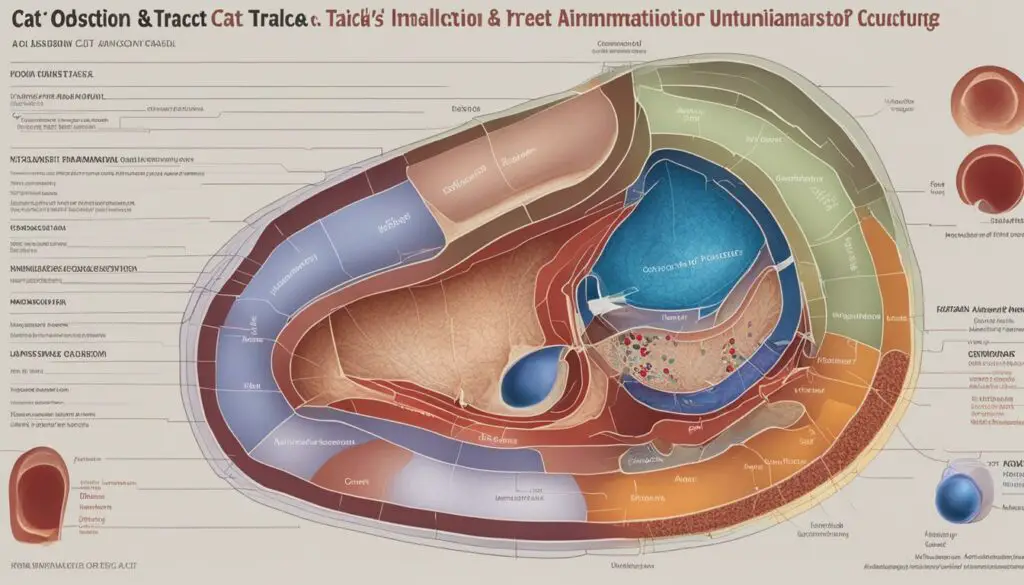
Crystals in Urine
When a male cat meows in the litter box, it may be a sign of discomfort caused by urinary crystals. These tiny crystal-like formations in the urine can irritate the urinary tract, leading to meowing and increased frequency of urination. Crystals in the urine can be influenced by various factors, including diet, hydration, and individual predisposition.
To address urinary crystals in cats, it is important to consult with a veterinarian for proper diagnosis and treatment. The vet may recommend dietary changes, such as a specialized diet formulated to dissolve crystals or promote urinary tract health. Additionally, increasing the cat’s water intake through wet food or a water fountain can help flush out the crystals and maintain hydration.
In some cases, urinary crystals may require more extensive treatment, such as the use of medication to dissolve the crystals or surgical intervention to remove them. Regular monitoring and follow-up with the veterinarian are crucial to ensure the urinary tract health of your male cat and prevent further complications.
Table:
| Possible Causes of Urinary Crystals | Treatment Options |
|---|---|
| Dehydration | Increasing water intake through wet food or a water fountain |
| Dietary factors | Switching to a specialized diet formulated to dissolve crystals or promote urinary tract health |
| Individual predisposition | Ongoing monitoring and follow-up with a veterinarian |
| Underlying medical conditions | Medication, surgery, or other targeted treatments as recommended by a veterinarian |
By understanding and addressing the causes of urinary crystals in cats, you can help alleviate your male cat’s discomfort and prevent the recurrence of this issue. Regular veterinary care, a balanced diet, and proper hydration play key roles in maintaining urinary tract health and overall well-being.

Bladder Or Urinary Tract Inflammation Or Infection
Bladder or urinary tract inflammation and infection are common causes of meowing in the litter box for male cats. These conditions can cause pain and discomfort, leading to vocalization during elimination. Bacterial infections, such as urinary tract infections, or conditions like Feline Idiopathic Cystitis can lead to these symptoms. It is important to address the underlying cause and provide appropriate medication to alleviate the cat’s discomfort.
Inflammation and infection in the bladder or urinary tract can be diagnosed through urinalysis and veterinary examination. Antibiotics may be prescribed to treat bacterial infections, while Feline Idiopathic Cystitis may require a combination of medication, stress reduction techniques, and environmental modifications. Providing a calm and stress-free environment for your cat and ensuring they have access to clean litter boxes may help prevent and manage these conditions.
It is crucial to monitor your cat’s litter box behaviors and seek veterinary care if you notice persistent meowing or signs of discomfort during elimination. Prompt diagnosis and treatment can prevent complications and improve your cat’s overall urinary tract health.
| Signs of Bladder or Urinary Tract Inflammation/Infection | Treatment Options |
|---|---|
| Meowing or vocalization during elimination | Antibiotics for bacterial infections |
| Frequent urination | Medication for Feline Idiopathic Cystitis |
| Straining to urinate | Stress reduction techniques |
| Blood in urine | Environmental modifications |
| Urinating outside of the litter box | Monitoring litter box hygiene |
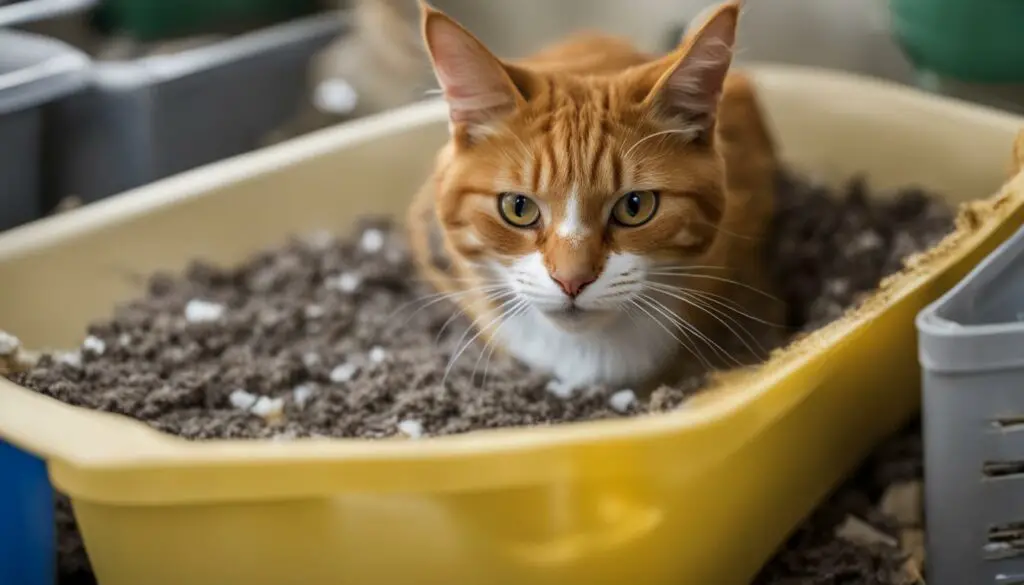
It is always best to consult with a veterinarian if you notice any changes in your cat’s litter box behavior or signs of discomfort. They can provide a proper diagnosis and develop a treatment plan to address the underlying cause of meowing in the litter box. Remember, early intervention is crucial for maintaining the urinary tract health and well-being of your male cat.
Constipation And Impacted Anal Sacs
Constipation and impacted anal sacs are common issues that can cause discomfort and pain for your male cat during elimination, leading to meowing in the litter box. Constipation occurs when your cat has difficulty passing stools due to hardened feces or inadequate fiber intake. This can be caused by dehydration, diet, or underlying medical conditions. Impacted anal sacs, on the other hand, occur when the glands in your cat’s anus become blocked and cannot release their secretions. This can cause discomfort and even infection.
If your cat is experiencing constipation, you may notice him straining in the litter box, producing small, dry stools, or showing signs of discomfort. Impacted anal sacs can also cause similar symptoms, including excessive licking or scooting. It is important to address these issues promptly to alleviate your cat’s discomfort.
To help relieve constipation, you can try increasing your cat’s fiber intake by incorporating canned pumpkin or adding fiber supplements to his diet. Ensuring he stays hydrated is also crucial, as dehydration can worsen constipation. If the issue persists, it is best to consult with your veterinarian, who can provide further guidance and recommend appropriate treatment options.
For impacted anal sacs, it is important to have them expressed by a veterinarian to relieve the blockage and prevent infection. This is a quick and simple procedure that your veterinarian can perform during a regular check-up or visit. In some cases, if the issue is recurring, your veterinarian may recommend dietary changes or other interventions to help manage your cat’s anal sac health.
| Signs of Constipation | Signs of Impacted Anal Sacs |
|---|---|
|
|
Remember, if your cat is experiencing constipation or impacted anal sacs, it is important to seek veterinary care. Your veterinarian can provide a proper diagnosis and recommend the most appropriate treatment options to ensure your cat’s comfort and well-being.
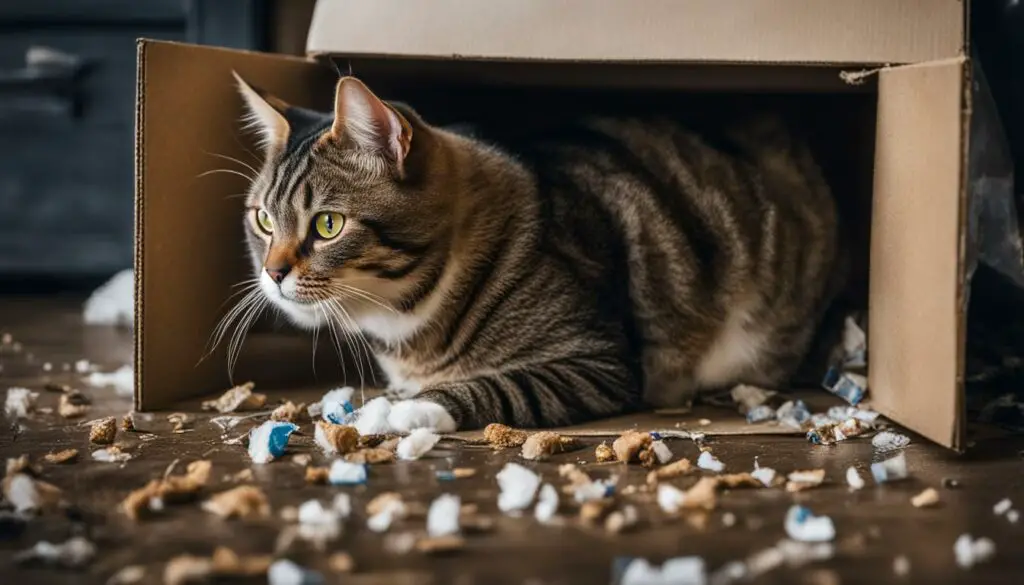
In this section, we have explored the causes and solutions for constipation and impacted anal sacs in male cats. These issues can cause discomfort and pain during elimination, leading to meowing in the litter box. By understanding the signs and seeking timely veterinary care, you can help alleviate your cat’s discomfort and improve his overall well-being. Remember, constipation and impacted anal sacs are common issues that can be effectively managed with proper care and treatment.
Behavioral Issues
When a male cat meows in the litter box, it may not always be due to medical reasons. Sometimes, behavioral issues can be the cause. Cats may meow in the litter box as a way to express stress or seek attention from their owners. Understanding and addressing these behavior issues is essential to ensure the well-being of your furry friend.
Stress in cats can manifest in various ways, including meowing in the litter box. Changes in the environment, such as moving to a new house or the addition of a new pet, can trigger stress in cats. Creating a calm and secure environment for your cat, with plenty of hiding places and vertical space, can help reduce their stress levels.
Attention-seeking behavior is another common reason for cats to meow in the litter box. Cats crave interaction and playtime with their owners, and they may meow to get your attention. Taking the time to engage in regular play sessions and providing ample mental stimulation can help fulfill their needs and reduce meowing in the litter box.
| Behavioral Issues | Causes |
|---|---|
| Stress in cats | Changes in the environment, new pets, lack of hiding places |
| Attention-seeking behavior | Lack of interaction, boredom |
Addressing Behavioral Issues
To address behavioral issues that cause meowing in the litter box, it is important to first identify the underlying cause. If stress is the issue, providing a safe and secure environment, using Feliway diffusers, and implementing a routine can help reduce anxiety. If attention-seeking behavior is the cause, increasing interaction, providing interactive toys, and dedicating regular playtime can help fulfill your cat’s needs.
Remember, patience and understanding are key when addressing behavioral issues in cats. Punishment is not effective and can worsen the problem. Positive reinforcement, consistency, and creating a stimulating environment are essential in resolving behavioral issues.
By addressing behavioral issues, you can help your male cat feel more relaxed and content, reducing the occurrence of meowing in the litter box and ensuring a happy and healthy feline companion.
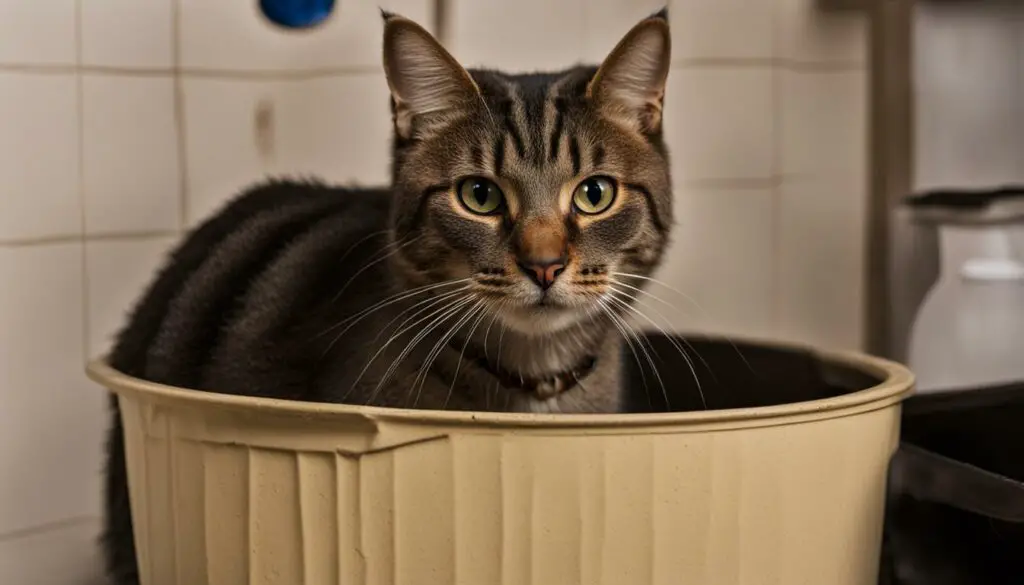
Stress Leading To Excessive Vocalization
Stress can significantly impact a male cat’s behavior, including vocalization in the litter box. Just like humans, cats can experience stress due to various factors, such as changes in their environment, routine disruptions, or even the presence of other animals. When cats feel stressed, they may vocalize more than usual, and the litter box can become a target for expressing their anxiety.
To address this issue, it is crucial to create a calm and secure environment for your cat. This can be achieved by providing a designated area for your cat’s litter box, away from noisy or high-traffic areas. Additionally, ensuring that your cat has a consistent daily routine and enough mental and physical stimulation can help reduce stress levels.
If you suspect that stress is the cause of your male cat’s excessive vocalization in the litter box, consider implementing stress-reducing techniques, such as pheromone diffusers or calming toys. These can help create a soothing atmosphere and provide your cat with a sense of security.
Reducing Stress in Cats:
- Create a quiet and safe space for your cat
- Maintain a consistent routine
- Provide mental and physical stimulation
- Use pheromone diffusers and calming toys
| Causes of Stress in Cats | Strategies to Reduce Stress |
|---|---|
| New environment or changes in the household | Gradually introduce changes, provide hiding spots |
| Lack of proper socialization | Slowly introduce new people and animals, positive reinforcement |
| Conflicts with other pets | Separate feeding areas, provide individual attention |
| Unfamiliar noises or loud environments | Provide a quiet space, use white noise machines |
| Insufficient mental or physical stimulation | Interactive toys, puzzle feeders, playtime with the owner |
By understanding and addressing the underlying causes of stress, you can help alleviate your male cat’s meowing in the litter box and promote a healthier and happier environment for your feline companion.
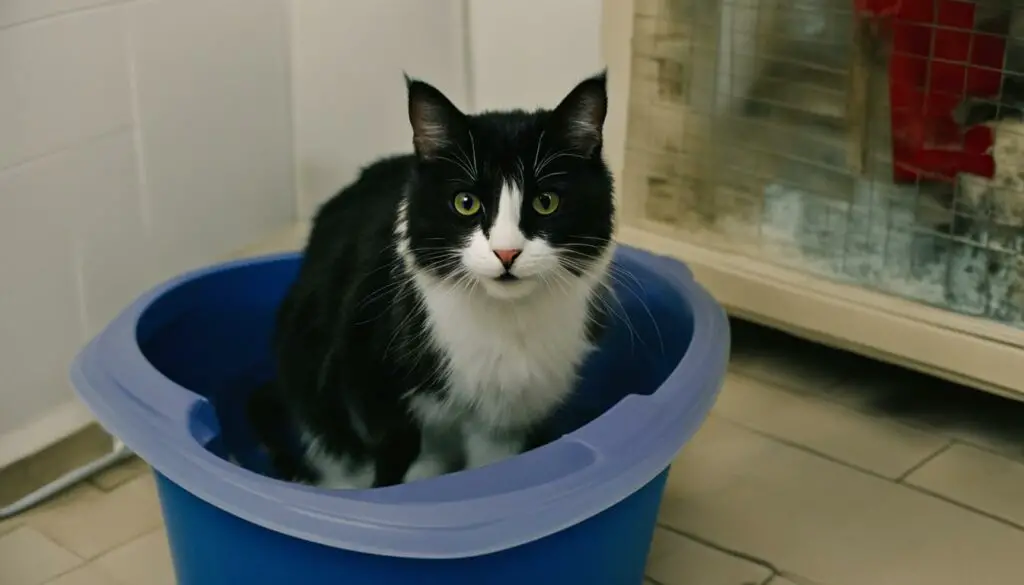
Facts About Stress in Cats:
Cats are highly sensitive creatures and can easily become stressed. It is essential to provide them with a safe and secure environment to prevent behavioral issues. Stress can manifest in various ways, including meowing in the litter box. By addressing the underlying causes of stress and implementing stress-reducing techniques, you can improve your cat’s overall well-being and minimize excessive vocalization.
Remember that each cat is unique, and what may cause stress in one may not affect another. Observing your cat’s behavior and providing the necessary support and care is crucial in maintaining their emotional and physical health.
Desire for Attention
It’s not uncommon for male cats to meow in the litter box as a way to seek attention from their owners. Just like humans, cats have individual needs for affection, interaction, and playtime. When they feel neglected or bored, they may use various methods to get our attention, and meowing in the litter box is one of them.
Cats are highly intelligent and social animals, and they rely on us to meet their emotional needs. When a cat meows in the litter box, they may be trying to tell us that they want more interaction or playtime. Engaging in regular play sessions with your cat using interactive toys not only provides physical exercise but also mental stimulation, which can help fulfill their attention-seeking desires.
In addition to playtime, it’s important to provide your cat with plenty of affection and quality time. Regularly petting and grooming your cat can strengthen the bond between you and provide them with the attention they crave. Creating a calm and peaceful environment for your cat, free from stress or distractions, can also help reduce attention-seeking behavior.
| Ways to Address Attention-Seeking Behavior in Cats |
|---|
| – Engage in interactive play sessions with your cat using toys that simulate prey movements. |
| – Spend quality time petting and grooming your cat to provide them with affection. |
| – Create a calm and stress-free environment for your cat, ensuring they have a comfortable space to relax. |
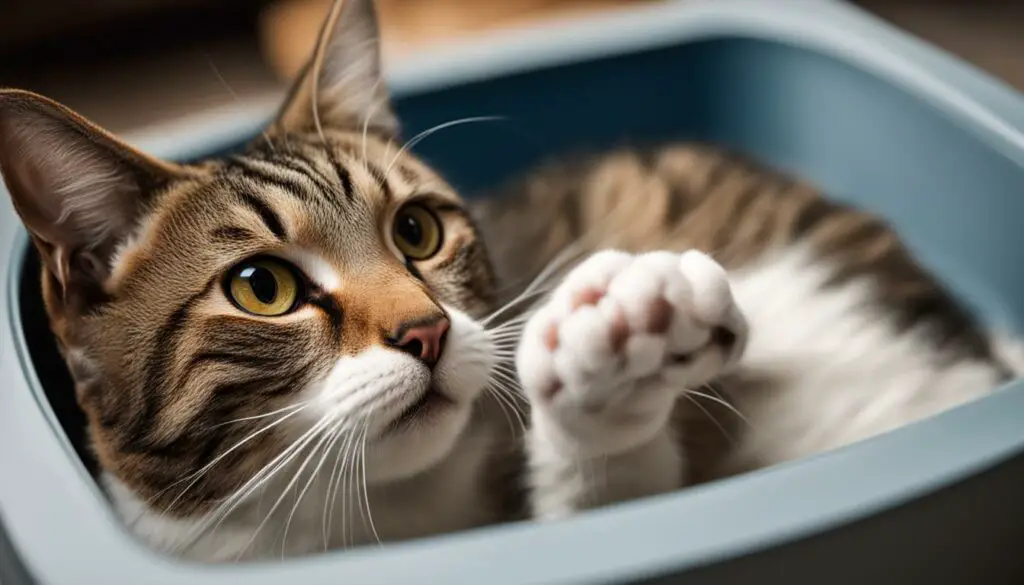
Understanding your cat’s desire for attention is key to addressing their meowing in the litter box. By providing the necessary attention, affection, and playtime, you can help fulfill their needs and reduce this behavior.”
Disorientation or Cognitive Dysfunction
As our beloved cats age, they may experience cognitive changes that can lead to disorientation and vocalization during elimination. Just like humans, aging cats can develop cognitive dysfunction, which affects their cognitive abilities and behavior. This condition can cause confusion, memory loss, and difficulty navigating their environment, leading to meowing in the litter box.
Older cats with cognitive dysfunction may exhibit symptoms such as meowing at night, pacing, or appearing easily confused. These changes can be distressing for both the cat and their owner. Environmental modifications can help manage these symptoms and provide a more comfortable living environment for our aging feline friends.
Creating a calm and secure space for your cat is essential. Ensure that their litter box is easily accessible, placed in a quiet area away from loud noises and distractions. Provide a litter box with low sides to facilitate easy entry and exit.
Additionally, offering mental stimulation and enrichment activities can help keep your cat’s mind engaged. Interactive toys, puzzle feeders, and gentle play sessions can all contribute to mental stimulation and provide a sense of purpose for your aging cat.
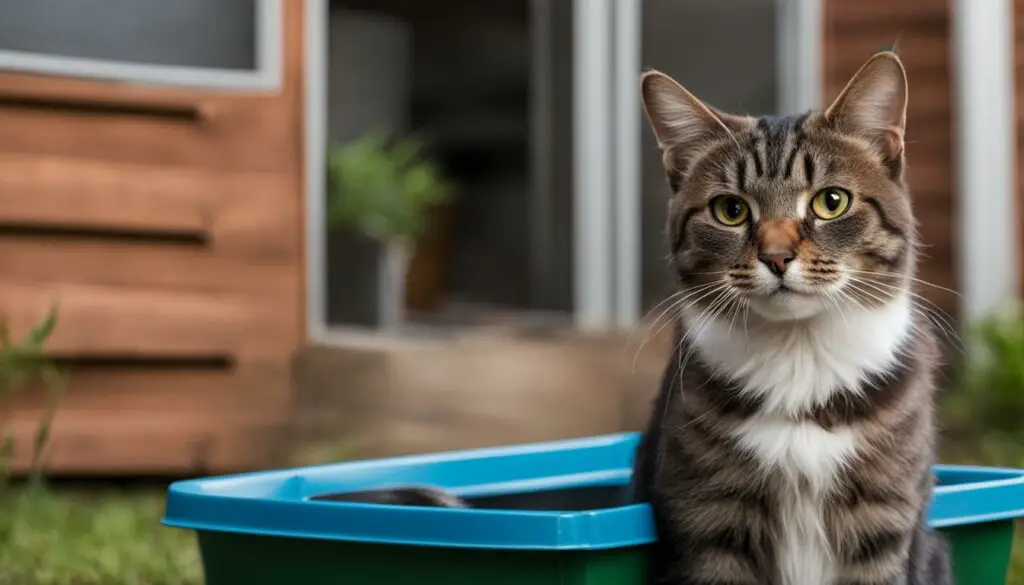
Table: Environmental Modifications for Cats with Cognitive Dysfunction
| Environmental Modification | Description |
|---|---|
| Quiet litter box location | Place the litter box in a peaceful area, away from noise and distractions. |
| Litter box accessibility | Choose a litter box with low sides for easy entry and exit. |
| Mental stimulation | Provide interactive toys, puzzle feeders, and play sessions to engage your cat’s mind. |
Reasons Why Cats Howl after Elimination
After a cat has finished using the litter box, it may sometimes let out a loud and distinctive howl. This vocalization can have several different meanings, depending on the cat’s behavior and needs. Understanding why cats caterwaul after elimination can help us address their needs effectively and ensure their overall well-being.
One possible reason behind a cat’s howling after elimination is excitement. Some cats may express their joy or satisfaction by vocalizing loudly. This behavior is similar to a human cheering or celebrating. It’s their way of expressing their happiness or relief at successfully using the litter box. In such cases, the howling is usually accompanied by other signs of excitement, such as tail wagging or playfulness.
Another reason cats may howl after elimination is to request assistance. If a cat is experiencing constipation or other intestinal blockages, it may struggle to complete the elimination process. In these situations, the cat may howl to signal that it needs help. It’s important to pay attention to these vocalizations and provide the necessary assistance or seek veterinary care if needed.
| Reasons Why Cats Howl after Elimination | Possible Explanation |
|---|---|
| Excitement | The cat is expressing joy or relief after successfully using the litter box. |
| Requesting Assistance | The cat is struggling with constipation or other intestinal blockages, needing help to complete the elimination process. |
| Desire for a Reward | The cat is expecting a treat or other form of reward after using the litter box. |
| Announcing Displeasure | The cat is communicating dissatisfaction with the litter box condition or other environmental factors. |
Additionally, cats may howl after elimination as a way of requesting a reward. Some cats have learned that vocalizing after using the litter box results in receiving treats or attention from their owners. This behavior is similar to how a dog might bark for a treat or give an enthusiastic wag of the tail. If your cat consistently howls after elimination, it may be expecting a reward and seeking positive reinforcement.
Lastly, cats may also howl after elimination as a means of announcing their displeasure. If the litter box is not clean or other environmental factors are causing discomfort, a cat may voice its dissatisfaction through loud vocalizations. This behavior can be seen as a way for the cat to communicate its needs or preferences, indicating that a change may be necessary to improve their litter box experience.
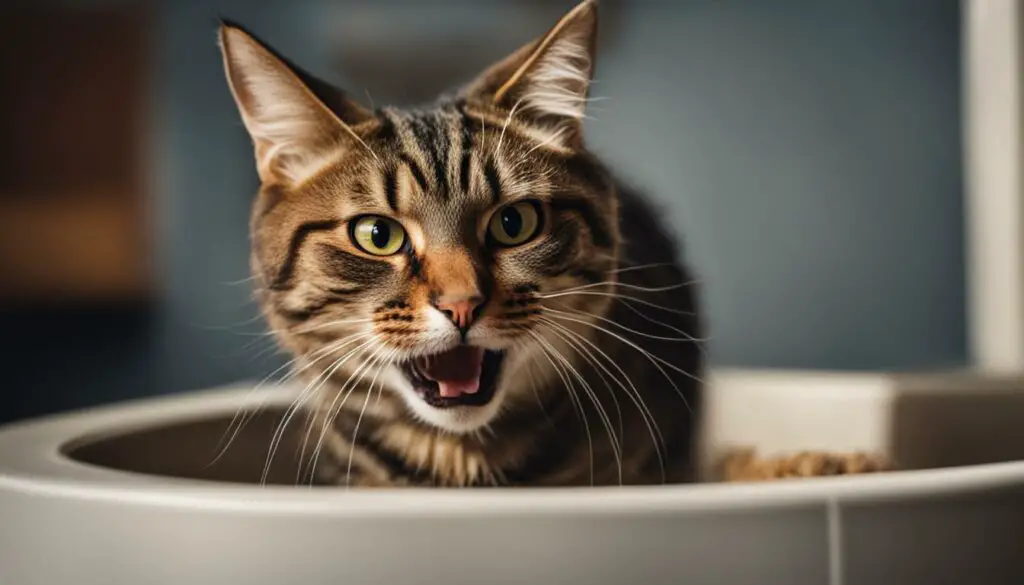
Conclusion
Understanding the reasons behind a cat’s howling after elimination is crucial for meeting their needs and ensuring their well-being. Whether it’s excitement, a request for assistance or reward, or communicating displeasure, paying attention to these vocalizations can help us provide the necessary care and make adjustments to the litter box environment as needed. By addressing these needs, we can create a comfortable and stress-free space for our furry friends to use the litter box.
Requesting Assistance
When a male cat meows in the litter box, it may be an indication that they are unable to eliminate properly. This can be distressing for both the cat and their owner, as it often indicates a blockage or constipation. Providing the necessary assistance is crucial in these situations to ensure the well-being of your furry friend.
There are several reasons why a cat may require assistance in the litter box. Constipation is one common cause, where the cat’s stool becomes hard and difficult to pass. Other intestinal blockages can also prevent proper elimination. If you notice your cat meowing in the litter box without producing any waste, it is important to check for signs of constipation or a blockage.
Seeking veterinary care is essential in these situations, as a professional can diagnose the underlying issue and recommend appropriate treatment. This may involve providing medication to address constipation, using stool softeners, or even performing a manual extraction. It is crucial to act promptly to prevent further discomfort or complications for your cat.
While it can be challenging to see your cat in distress, remember that seeking assistance from a veterinarian is the best course of action. They can provide the necessary expertise and support to help your cat eliminate properly and return to their happy, healthy self.
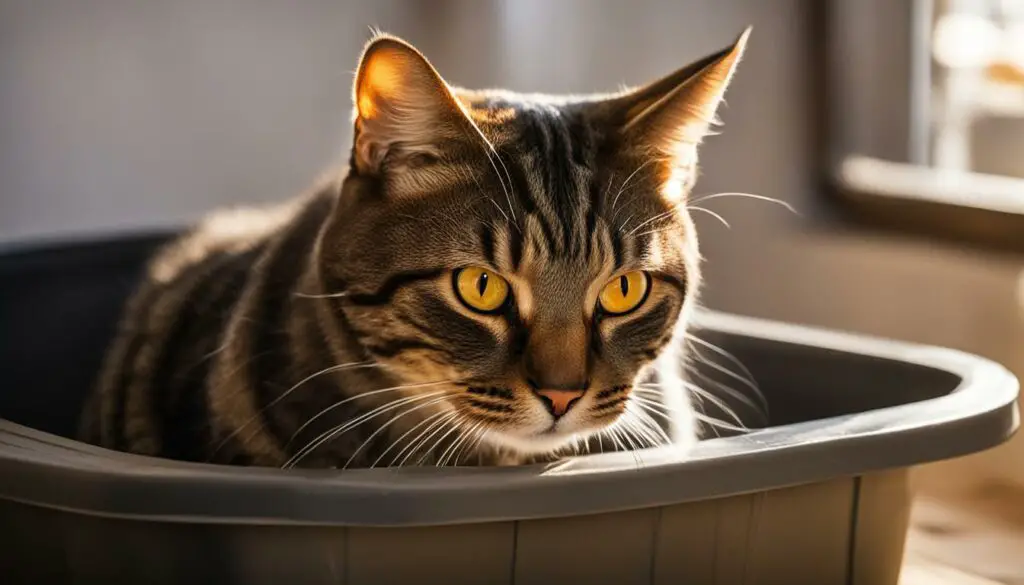
| Signs of Constipation or Blockage in Cats: | Steps to Provide Assistance: |
|---|---|
|
|
Request for Cleaning
When your male cat meows in the litter box, it could be a sign that he is requesting cleaning. Cats are naturally clean animals and prefer a tidy environment for eliminating. If the litter box is soiled or has a strong odor, your cat may vocalize his discomfort and signal the need for a clean litter box. Ensuring a clean litter box is not only important for your cat’s hygiene needs but also for maintaining his litter box habits and preventing potential behavior issues.
To meet your cat’s hygiene needs and prevent him from meowing in the litter box, it is recommended to scoop the litter box at least once a day. Remove any clumps or waste and replenish the litter as needed. Regularly replacing the litter and cleaning the litter box thoroughly can help maintain a clean and inviting environment for your cat.
Additionally, consider the type of litter you use. Some cats may have preferences for certain litter textures or scents. Experiment with different options to find what suits your cat’s preferences and encourages him to use the litter box without vocalizing his need for cleaning.
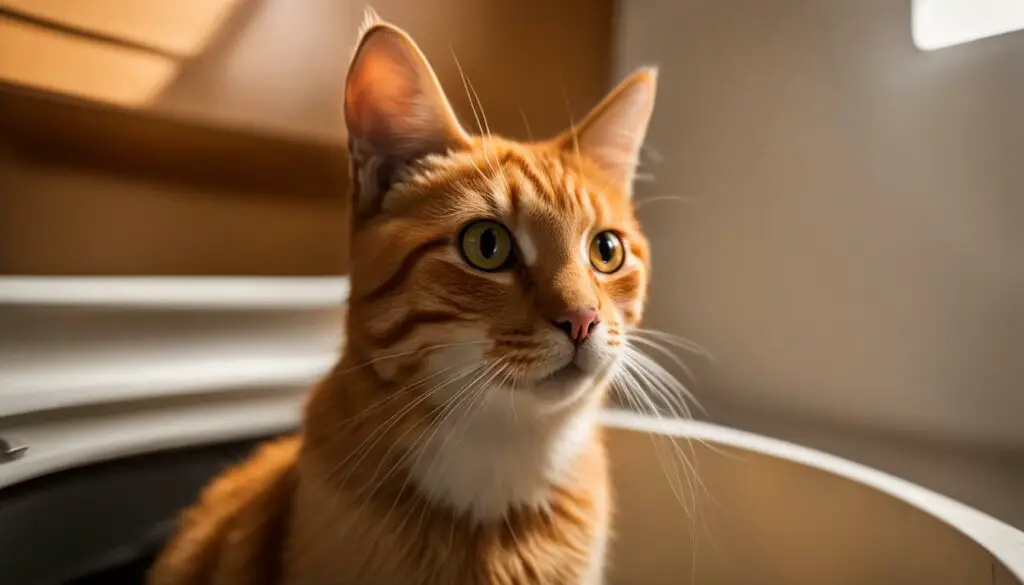
Signs Your Cat Is Requesting Cleaning
- Repeated meowing or vocalization while in the litter box.
- Pawing or scratching at the litter excessively.
- Showing signs of distress or discomfort, such as pacing or restlessness.
- Refusing to use the litter box altogether.
Tips for Maintaining a Clean Litter Box
- Scoop the litter box daily to remove waste and clumps.
- Replace litter regularly to ensure freshness.
- Clean the litter box thoroughly with mild soap and water on a regular basis.
- Experiment with different litter types to find what suits your cat’s preferences.
- Consider using litter box liners or mats to contain any mess and make cleaning easier.
| Benefits of a Clean Litter Box | Risks of an Unclean Litter Box |
|---|---|
| Provides a hygienic environment for your cat | Increases the risk of litter box aversion or refusal |
| Encourages proper litter box habits | Can lead to urinary tract issues |
| Prevents unpleasant odors in your home | Increases the likelihood of accidents outside the litter box |
Expression of Pain
When a male cat meows in the litter box, it can be a sign of pain or discomfort. One possible cause of this vocalization is arthritis, a common condition in cats, especially as they age. Arthritis can cause joint inflammation and stiffness, making it painful for cats to squat and eliminate in the litter box. Identifying and addressing the source of the pain is crucial to ensure the well-being of your furry friend.
Arthritis in cats can be managed through various treatments and lifestyle modifications. Providing your cat with a comfortable and easily accessible litter box can help alleviate the pain associated with arthritis. Consider using a litter box with low sides or ramps to make it easier for your cat to get in and out. Additionally, providing soft bedding or cushions in their favorite resting areas can help support their joints.
Regular veterinary check-ups are essential for cats with arthritis to monitor the progression of the condition and adjust their treatment plan accordingly. Your veterinarian may recommend medications or supplements to manage the pain and inflammation associated with arthritis. They can also provide guidance on weight management strategies and exercises that promote joint mobility.
| Treatment Options for Arthritis in Cats | Benefits |
|---|---|
| Pain medications | Relief from pain and discomfort |
| Joint supplements | Support joint health and reduce inflammation |
| Weight management | Reduce stress on joints |
| Physical therapy | Increase joint mobility and maintain muscle strength |
| Environmental modifications | Provide easy access to litter box and comfortable resting areas |
If you suspect that your male cat’s meowing in the litter box is due to pain, it is important to consult with your veterinarian. They can perform a thorough examination and recommend appropriate treatment options to address your cat’s specific needs. By addressing the expression of pain, you can help your cat live a comfortable and happy life.
Conclusion
In conclusion, understanding your male cat’s behavior when meowing in the litter box is crucial for addressing any potential issues. Whether it’s a medical condition, behavioral problem, or a simple desire for attention, being attentive to your cat’s needs is essential for their overall well-being.
By recognizing the potential causes behind your cat’s meowing, such as urinary tract issues, constipation, stress, or cognitive dysfunction, you can take appropriate steps to address these concerns. Seeking veterinary care, making environmental modifications, and providing the necessary attention, affection, and playtime can all contribute to reducing meowing in the litter box.
Remember, a clean litter box is essential for your cat’s hygiene and can help prevent behavior issues. Monitoring your cat’s litter box habits and seeking professional advice if you notice any unusual or persistent meowing is crucial. With proper understanding and care, you can ensure a happy and healthy life for your male cat.
FAQ
Why is my male cat meowing in the litter box?
Your male cat may be meowing in the litter box due to various reasons, including medical issues, behavioral issues, or a desire for attention.
What are some medical reasons for a cat’s vocalization in the litter box?
Cats may meow in the litter box due to medical conditions such as urinary tract infections, bladder inflammation, or the presence of crystals in the urine.
What should I do if my male cat has a blocked urethra?
A blocked urethra can be life-threatening for male cats. If you suspect a blockage, it is essential to seek immediate veterinary care.
How are crystals in the urine treated?
Treatment for crystals in the urine involves addressing the underlying cause and adjusting the cat’s diet. Veterinary guidance is recommended for appropriate management.
Can bladder or urinary tract inflammation cause a cat to meow in the litter box?
Yes, inflammation or infection in the bladder or urinary tract can cause pain and discomfort, leading to vocalization during elimination. Veterinary care is necessary for diagnosis and treatment.
What should I do if my male cat is constipated?
Constipation in cats requires prompt veterinary attention to alleviate discomfort and provide appropriate treatment. Do not attempt to resolve the issue at home without professional guidance.
Why do some cats meow in the litter box due to behavioral issues?
Cats may meow in the litter box as a result of stress or a desire for attention. Identifying and addressing the underlying cause can help reduce this behavior.
How can I reduce stress in my cat to prevent meowing in the litter box?
Creating a calm and secure environment for your cat and addressing the underlying causes of stress can help reduce meowing in the litter box. Consult with a veterinarian or animal behaviorist for guidance.
Why might my cat meow in the litter box to seek attention?
Some cats meow in the litter box as a way to get attention from their owners. Providing the necessary attention, affection, and playtime can help fulfill their needs and reduce meowing in the litter box.
Do older cats experience changes that can cause meowing in the litter box?
Yes, older cats may experience cognitive changes that can cause disorientation and vocalization during elimination. Environmental modifications and veterinary care can help manage these symptoms.
Why do cats howl after using the litter box?
Cats may howl after using the litter box for various reasons, including excitement, a request for assistance, a desire for a reward, or expressing displeasure. Understanding the specific reason can help address their needs.
What should I do if my cat is unable to eliminate?
If your cat is meowing in the litter box and unable to eliminate, it may indicate constipation or other intestinal blockages. Providing appropriate help or seeking veterinary care is essential in these situations.
Why might my cat meow in the litter box to signal the need for cleaning?
Cats may meow in the litter box to indicate the need for cleaning if the litter is soiled. Ensuring a clean litter box is important for their hygiene and can help prevent behavior issues.
Is meowing in the litter box a sign of pain or discomfort?
Yes, meowing in the litter box can indicate pain or discomfort, including conditions like arthritis or urinary tract infections. Identifying and addressing the source of the pain through veterinary care is crucial.
How can I understand my male cat’s meowing in the litter box better?
Understanding and addressing the underlying reasons behind your male cat’s meowing in the litter box is important for their overall health and well-being. Observe their behavior, consult with a veterinarian, and make any necessary changes to their environment or routine.
Source Links
- https://litter-boxes.com/cat-meow-litter-box/
- https://vcahospitals.com/know-your-pet/the-cats-meow-caterwauling-in-cats
- https://www.seniorcatwellness.com/why-does-my-cat-meow-loudly-after-using-the-litter-box/

